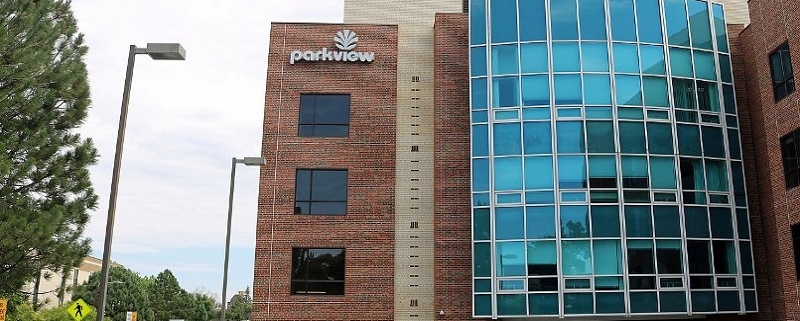On a chilly morning last month, Darrin Smith, the president and CEO of Pueblo’s Parkview Health System, stood outside the 100-year-old system’s flagship hospital and gazed upon a bundled-up crowd.
“This is a wow moment,” Smith said. “This is a wow moment for Parkview and for the citizens of southern Colorado.”
The occasion was to announce that Parkview would no longer be an independent health care system. Instead, with Parkview’s absorption into the UCHealth system, it became the latest example of a trend of consolidation sweeping through the hospital industry, including in Colorado.
Both systems are nonprofit, so this was a merger and not a purchase. Terms of the deal were simple: As part of the merger, UCHealth committed to spending at least $175 million over the next 10 years for the benefit of Parkview, and it cut a $5 million check to the related Parkview Foundation to fund various projects and services in the community. The merger also provides additional strength to UCHealth, which has been expanding its footprint. Already, UCHealth is the state’s largest hospital system in terms of net patient revenue.
“It’s just the next step in an overall trend of the last 15 years or more of consolidation of hospitals and hospital systems,” said Allan Baumgarten, a Minnesota-based health care analyst who produces studies on the Colorado hospital market. “In the case of UCHealth, they’ve been expanding and basically establishing a presence certainly along the entire Front Range and a little bit into the mountains.”
Why Parkview Wanted The Merger
The two health systems first agreed to a merger letter of intent in October 2022, and Colorado Attorney General Phil Weiser signed off on the merger in May. But Judy Fonda, the chair of Parkview’s board of directors, said at last month’s ceremony to mark the transition that discussion around a merger with another health care system had been ongoing for quite a while.
“Our board has recognized for some time that the hospital would be strengthened by partnering with a larger health care system,” Fonda said.
The motivation for that can be found in Parkview’s balance sheets. Like many non-metro Denver hospitals, Parkview has struggled financially in recent years. The health system lost $11 million last fiscal year and $43 million the year before that, according to an audited financial statement filed with the federal Municipal Securities Rulemaking Board. The bulk of those losses came from operations — meaning the hospital wasn’t getting paid enough to cover its costs of providing medical care.
In 2022, Parkview closed its inpatient psychiatric unit, citing financial burden, according to The Pueblo Chieftain. In the merger notice it provided to the Colorado Attorney General’s Office, UCHealth pledged that Parkview will continue to provide maternity care and comprehensive women’s health care — something that’s significant given that those services are often targets for cash-strapped hospitals.
In talking about the merger, Parkview leaders often spoke of continuity — that Parkview would continue to exist to provide care, that it would continue to be a major employer and contributor to the region’s economy.
“Becoming part of the UCHealth family strengthens the care provided in our community, ensuring the patients and residents in Pueblo and southern Colorado will continue to have access to high-quality care,” Smith said during the merger ceremony.
Why UCHealth Wanted The Merger
In her remarks at the ceremony, UCHealth president and CEO Elizabeth Concordia likewise framed the merger in terms of patient care.
“We are very, very focused on making sure that Parkview thrives and that patients can continue to come here close to home for their care,” Concordia said.
But Baumgarten said the merger also strengthens UCHealth’s hand financially in the state.
“Having that geographic footprint and having that site gives them considerable bargaining strength when they’re negotiating with the major payors in the state,” Baumgarten said.
In other words, UCHealth can now negotiate higher prices with private insurers. This is one of the major concerns surrounding the consolidation trend. Studies have found that hospital consolidation drives up prices and insurance costs.
That’s one explanation for the merger craze in the hospital industry nationwide. By one analysis, there were more than 1,800 hospital mergers in the U.S. between 1998 and 2022, reducing the number of independent hospitals by 2,000. A Kaiser Family Foundation analysis found that, by 2017, two-thirds of hospitals nationally were part of health systems, up from a little over 50% in 2005.
In Colorado, UCHealth scooped up Yampa Valley Medical Center in Steamboat Springs in 2017. CommonSpirit Health acquired St. Elizabeth Hospital in Fort Morgan in 2022, and Colorado-based SCL Health merged with Intermountain Health the same year.

The exterior of the University of Colorado Hospital on the Anschutz Medical Campus in Aurora, photographed on Oct. 18, 2019. The hospital is the flagship of the UCHealth system. (PHOTO CREDIT: John Ingold, The Colorado Sun)
Baumgarten said the Parkview merger has other benefits for UCHealth beyond negotiating leverage. For one, as a system with teaching and research as part of its core mission, it now has access to more patients who can potentially be recruited for clinical trials. The merger also gives UCHealth specialists a larger patient base for referrals.
According to another document filed with the MSRB, Parkview saw roughly 150,000 outpatient visits and more than 68,000 inpatient days last fiscal year.
“Each of those patients has value to the UCHealth system,” Baumgarten said.
Standing outside his hospital last month, Smith, Parkview’s CEO, focused instead on the value the hospital’s new owner will bring to his patients.
“I am filled with hope for what lies ahead,” Smith said. “This partnership between UCHealth and Parkview heralds a new era of progress and innovation for Pueblo and southern Colorado.”
Source: Colorado Sun






